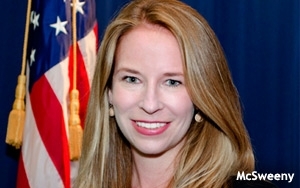 The technology that advertisers use may have changed, but the Federal Trade Commission’s mission remains the same.
The technology that advertisers use may have changed, but the Federal Trade Commission’s mission remains the same.
That was the main message in FTC Commissioner Terrell
McSweeny’s first address before the advertising industry Tuesday at the Association of National Advertisers annual advertising law and public policy conference in Washington.
McSweeny, one of three Democratic commissioners on the FTC, is just wrapping up her first year at the agency. She covered the waterfront of issues affecting the ad business,
starting with recent enforcement cases where advertisers failed to disclose a material connection between the endorsers and the advertised product or service.
For example, Sony used its
employees to generate buzz for a new game console, Amerifreight paid consumers to write positive reviews, and Lindsey Duncan touted the weight-loss benefits of green coffee bean extract through an
appearance on The Dr. Oz Show, The View and other programs.
advertisement
advertisement
“I admit it’s hard to catch consumers’ attention,” McSweeny said, “but disclosing material connection
with endorsers holds true whether it’s Twitter, third party review sites, or The Dr. Oz Show.”
She also repeated the commission’s call for Congress to pass a national data
breach and security law.
“We need additional protections for consumers, particularly with regard to security and the increasing wide range of devices in the Internet of Things,”
McSweeny said.
To protect consumers across what could be 50 billion devices by 2020, the FTC is advocating that Congress expand the FTC’s authority to broaden the definition of
“personal information” and give it authority to seek civil penalties.
McSweeny also addressed what will happen to the FTC’s authority when the Federal Communications
Commission’s net neutrality order classifies Internet service as a common carrier. Because common carriers are exempt from FTC regulation, the agency’s authority over broadband providers
could be limited.
But no one really knows. “The issue is whether reclassification will erode the FTC’s jurisdiction in a substantial way, but it’s too soon to tell,”
McSweeny said. She added that she “would be crazy” not to urge Congress to do away with the common-carrier exemption.
When pressed about whether there should be one standard
across government agencies for data security and privacy, McSweeny had a diplomatic answer. “I don’t believe we necessarily have to have one cop on the beat.” However, McSweeny
reminded the audience that is the FTC that has “an excellent 25-year track record” in these issues. “So it’s my hope we will continue to work with the FCC,” she
said.
The FTC, McSweeny said, was currently in the process of updating its data security best practices. She added that the agency hopes its new office of technology and investigation
-- which will hire additional technical experts -- will enable the agency to chart recommendations without also dictating specific technological measures.